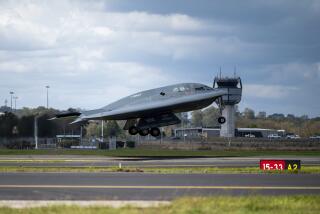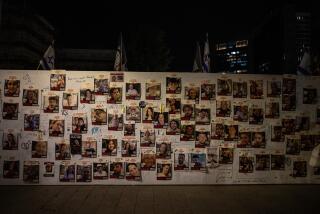Terror’s stealth weapon: women
- Share via
SAJIDA RISHAWI shocked the world when she appeared on Jordanian television and admitted her role in the plot to blow up a wedding at a hotel in Amman on Nov. 9. Her monotone speech and lack of emotion sparked an instant debate regarding the growing role of female terrorists and suicide bombers.
The stereotype exploited by terrorists is that women are gentle, submissive and nonviolent. Women evade most terrorist profiles because they are perceived as wives and mothers, victims of war-torn societies, not bombers. But terrorist organizations are increasingly employing women to carry out the most deadly attacks.
Based on my study of suicide bombings in Chechnya, Sri Lanka, Israel and the occupied territories, Lebanon, Morocco, Egypt and Iraq, 34% of attacks since 1985 have been carried out by women.
The use of the least-likely suspect is an obvious tactical adaptation for a terrorist group under scrutiny. Female operatives not only better penetrate a crowd of civilians because women are assumed to be noncombatants, they get more publicity than their male counterparts. And using women can mobilize greater numbers of operatives by shaming men into participating. “I am going to fight instead of the sleeping Arab armies who are watching Palestinian girls fighting alone,” said Ayat Akras in the martyrdom video she taped before she blew herself up in Israel in 2002.
In the past, women’s primary contribution to suicide terrorism was to give birth to fighters, to raise them in a revolutionary environment and to praise them after their deaths. Women are now taking a leading role of their own -- using their bodies as human detonators for the explosive material strapped around their waists. To complicate the notions of femininity and motherhood, the explosive device is often disguised under a bomber’s clothing to make her appear pregnant and thus even further beyond suspicion. Female suicide bombers have transformed the revolutionary womb into an exploding one.
Initially, only secular groups employed women. Islamist organizations such as Islamic Jihad refused female operatives. A Palestinian suicide volunteer named Dareen abu Aisheh blew herself up in 2002 on behalf of a secular organization after having being turned away by her first choice, Hamas, according to her relatives. That changed after the second war in Chechnya, when in 2002 the so-called Black Widows took a leading role in bombing Russian concert halls, hotels and trains. Women have now been used in suicide bombings throughout the Middle East and North Africa, Sri Lanka, Turkey, Pakistan and Colombia.
Al Qaeda, the last holdout, initiated a special website in August 2004, calling on women to persuade their men to take up the jihad. The pretty pink website, which included beauty tips, did not call on women to become bombers. Nevertheless, women affiliated with Al Qaeda began blowing themselves up within the year.
Why? Like male suicide bombers, their motives vary. Contrary to popular perception, they are not unbalanced sociopaths, nor are they poor, uneducated religious fanatics. According to their suicide videos and interviews with those who knew them, the women are most often driven by the desire to avenge the deaths of relatives, to redeem the family name, to escape a sheltered life or to equalize patriarchal societies.
Arab feminists argue that women want to show that they are as dedicated to the cause as their brothers, sons and fathers.
What is so compelling about why women become suicide bombers is that so many claimed to have been raped or sexually abused by enemy forces, according to interviews with those who knew them. Once dishonored, they are no longer marriageable. Joining a terrorist group is one of the few remaining options for women who, according to the strict honor code followed in some Islamic societies, must otherwise be executed by their own families. With their deaths they reinvent themselves as martyrs, redeeming the family name and recouping lost honor.
An opposition Egyptian newspaper, Al Shaab, carried a 2002 article arguing that a Palestinian female suicide bomber had “blown herself up, and with her exploded all the myths about women’s meekness, submissiveness and enslavement.”
However, although many of the bombers have been eager martyrs, there is evidence that some have been manipulated or used as pawns by men. The Chechen women who helped take over the Dubrovka Theater in Moscow in 2002 did not control the detonators for their explosive devices, according to surviving hostages. Reem Riyashi, Hamas’ first female bomber and a mother of two, was reportedly coerced to become a shahida, or female martyr, in 2004 by her husband and her lover, who together decided that the extramarital affair brought such shame that only martyrdom could resolve it, according to the Israeli security services. Although women have perpetrated over a third of the Tamil Tigers’ suicide attacks in Sri Lanka and have separate combat units, few women command and none lead.
It becomes clear that perpetrating violence has done little to help women level the playing field in societies that consider their deaths more valuable than their lives. But in death, they serve another grim purpose: prompting security services around the world to subject women, including pregnant women, to humiliating and sometimes invasive searches -- thus feeding the resentments that lead to more terror.
More to Read
Sign up for Essential California
The most important California stories and recommendations in your inbox every morning.
You may occasionally receive promotional content from the Los Angeles Times.










